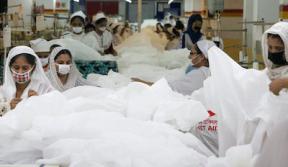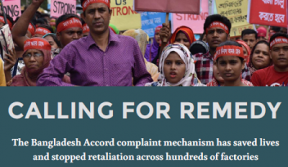The International Labor Rights Forum calls on the US government to adopt regulations to end the unsafe and illegal conditions behind federal government apparel purchases, following revelations in today’s New York Times investigative story, which links abusive working conditions in overseas sweatshops to purchasing by several US federal agencies and entities. In a statement of ten steps to safe and legal conditions in US government contractor facilities, ILRF called for supply chain transparency; adoption and enforcement of labor standards in procurement, licensing and military exchange supply chains; and addressing the root causes of labor violations through fair pricing and related responsible purchasing practices.
“Over a year after 112 workers were killed in a fire at a factory that sewed Marines logo clothing, the rest of the US government still has not taken action to prevent unsafe and abusive working conditions in the factories that make procured or licensed apparel, or clothing sold at military exchanges,” said Judy Gearhart, executive director of the International Labor Rights Forum. “The Tazreen fire – and the Rana Plaza building collapse that killed ten-fold more garment workers just a few months later – should be a wake-up call to the US government to put into place enforceable labor standards to ensure workers’ rights and transparency in government supply chains.”
“When the military exchanges are following Walmart, they are not taking responsibility,” said Kalpona Akter, executive director of the Bangladesh Center for Worker Solidarity. “Walmart has failed to save workers’ lives in Bangladesh. In fact, Walmart’s auditing system is among the worst. They know the factories are death traps and are not taking any meaningful action.”
“Many public universities and colleges, states, cities, and other local government agencies already require the apparel they buy or license to be made in lawful, safe, and decent working conditions. They have established due diligence procedures, including supply chain transparency, independent factory inspections, and an effective remedy process. The federal government should join with these public institutions and reinforce their efforts to identify and remedy safety and labor abuses in factories around the world that make uniforms and other apparel for government employees and programs,” said Bjorn Claeson, executive director of the Sweatfree Purchasing Consortium. “The time to act is now, before a supplier to the federal government becomes the next Tazreen or Rana Plaza.”
ILRF applauded the move by Marine Corps Trademark and Licensing Office to require licensees that manufacture in Bangladesh to join the Accord on Fire and Building Safety in Bangladesh, and called on other federal agencies to follow suit.

